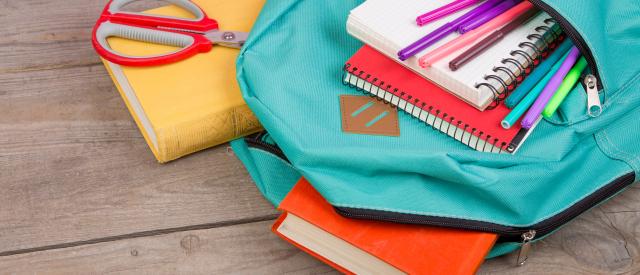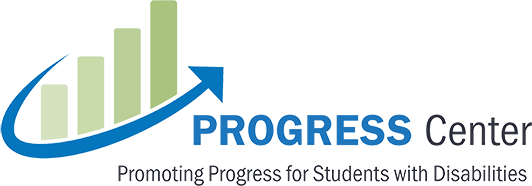Prepping for PROGRESS 2022 Event Archive and Materials

- Home
- prepping progress event 2022
- Node view
Prepping for PROGRESS Event 2022
Prepping for PROGRESS! Adding New Tools to Your Backpack (Toolbox) for the Start of School focuses on sharing information, resources, and lessons learned to support the development and implementation of high-quality educational programming for students with disabilities. Materials and recordings for each session are available below.
Day 1: Welcome & Keynote
This session includes an introduction to the event and keynote presentation. In the keynote, Dr. Tessie Rose Bailey focuses on critical considerations for developing and implementing high-quality educational programming for students with disabilities that ensures access to free appropriate public education (FAPE) and progress toward appropriately ambitious goals.
Session Materials
Day 1: Welcome and Keynote Slides
PowerPoint Slides
Video
Day 1: Welcome and Keynote Transcript
Transcript
Day 1: Welcome and Keynote Related Tools & Resources
- Path to PROGRESS: Developing and Implementing High-Quality Educational Programs Online Module
- Stories from the Classroom: Appreciating High Expectations
Links to Resources
Strand 1: Making Connections! Ensuring the Parts of the IEP Work Together to Promote Progress
In this session, participants learn why developing an internally consistent IEP is important and how to look at the IEPs they design to make sure the parts fit together to promote progress. Part 1 of the session focuses on the present levels of academic achievement and functional performance (PLAAFP) statement and how it provides the foundation of the IEP. Part 2 demonstrates how a well-written PLAAFP statement can help you more efficiently develop the other parts of the IEP.
Session Materials
PowerPoint Slides
Handout
Video
Transcript
Strand 1: Related Tools & Resources
- IEP Tip Sheets
- IDEA and the IEP: From Compliance to PROGRESS
- The What and Why of Present Levels of Academic Achievement and Functional Performance (PLAAFP)
- The What and Why of Measurable Annual Goals
Links to Resources
Strand 2: Expanding Your Toolbox for Preparing Educators to Promote Progress!
This session highlights and shares how to use ready-made high-quality resources from the PROGRESS Center to prepare in-service and pre-service educators working with students with disabilities.
Session Materials
PowerPoint Slides
Video
Transcript
Strand 2: Related Tools & Resources
Links to Resources
Day 2: Welcome and Panel
This session includes a panel discussion with a young adult with a disability, a parent, an assistive technology coordinator, a special education administrator, and a special educator. These panelists share their perspectives and stories, with a focus on what it takes to implement high-quality educational programming that promotes progress for students with disabilities.
Session Materials
Day 2: Welcome and Panel Slides
PowerPoint Slides
Day 2: Welcome and Panel Transcript
Transcript
Concurrent Session: Start the School Year Right by Promoting Belonging of All Students
How can you ensure all students in your school feel like they belong? In this session the TIES Center and PROGRESS Center define 10 elements of belonging, which, when addressed together, promote learning environments in which all students with disabilities thrive and are seen as valued members of the school community. The session defines the elements, provides examples of how the elements look in schools, and shares freely available resources to support educators as they promote belonging within their schools.
Session Materials
PowerPoint Slides
Handout
Video
Transcript
Belonging Related Tools & Resources
- Stories from the Classroom: Finding Belonging
- Ten Ways Schools Can Foster Belonging Among Students With and Without Disabilities
- Creating Communities of Belonging for Students with Significant Cognitive Disabilities
- The Power of Peers: Introduction to the Peer Engagement Implementation Guides
- Inclusion, Friendships, and the Power of Peers
- Fostering Self-Determination Among Children and Youth with Disabilities— Ideas from PARENTS for PARENTS
- Your Journey to Self-determination Series
Links to Resources
Concurrent Session: Collaboration Compass: Engaging Parents on a Path to PROGRESS
Family participation is an essential feature of the development and implementation of high-quality educational programming for students with disabilities. In this session, presenters share findings from a series of focus groups with families and caregivers, resources from the PROGRESS Center, and partners that schools can use to help families feel knowledgeable and confident in supporting the development and implementation of their children’s IEPs. The session also highlights how Rhode Island is working with local educators to improve family engagement.
Session Materials
PowerPoint Slides
Collaboration Compass Transcript
Transcript
Collaboration Compass Related Tools & Resources
- Using Parent and Youth Feedback to Inform High-Quality Educational Programming for Students with Disabilities
- Stories from the Classroom: Hearing Parents’ Priorities
- Resources for Families and Students
Links to Resources
Concurrent Session: Did We Do What We Said We Would? Why Developing a High-Quality IEP Isn’t Enough!
Developing a high-quality IEP is important, but teams also must think about how the IEP is implemented to promote progress. This session focuses on the importance of implementation in providing FAPE, reviews five elements to consider when thinking about fidelity, shares tools for monitoring fidelity, and demonstrates how to use fidelity data with student progress-monitoring data to make decisions about student responsiveness and program delivery.
Session Materials
Did We Do What We Said We Would? Slides
PowerPoint Slides
Did We Do What We Said We Would? Transcript
Transcript
Did We Do What We Said We Would? Related Tools & Resources
- Considerations for Effective Implementation: 5 Elements of Fidelity
- Student Intervention Implementation Log
Links to Resources
Concurrent Session: Providing a Free Appropriate Public Education (FAPE): Lessons From the Due Process Hearing Front
The essential obligation of school districts is to provide a FAPE to students with disabilities who are eligible for special education services under the IDEA. The development and implementation of a student’s IEP are how a FAPE is conferred. It has been estimated that 80% to 90% of all due process hearings and special education litigation involve FAPE-related issues. In this session, presenters provide practical information from the due process hearings to ensure that school-based IEP team members are crafting educationally meaningful and legally sound IEPs.
Session Materials
Lessons From the Due Process Hearing Front Slides
PowerPoint Slides
Lessons From the Due Process Hearing Front Related Tools & Resources
- Introduction to Federal and State Laws Impacting Students With Disabilities
- Recommendations and Resources for Preparing Educators in the Endrew Era
- IEPs: How Administrators Can Support the Development and Implementation of High-Quality IEPs
Links to Resources
Closing Session: Now That Your Backpack (Toolbox) Is Packed, Let’s Promote Progress!
This session celebrates what participants learned across all the sessions at the two day event, reminds participants where they can access the tools and resources from the PROGRESS Center and partners that were shared during the event, and highlights some upcoming resources and opportunities to support continued learning.
Session Materials
PowerPoint Slides
Transcript
Closing Session: Related Tools & Resources
- Development of High-Quality Educational Programming for Students With Disabilities
- Implementation of High-Quality Educational Programming for Students with Disabilities
- Online Training Modules
- Stories from the Classroom Videos
- All Resources and Tools
Links to Resources
